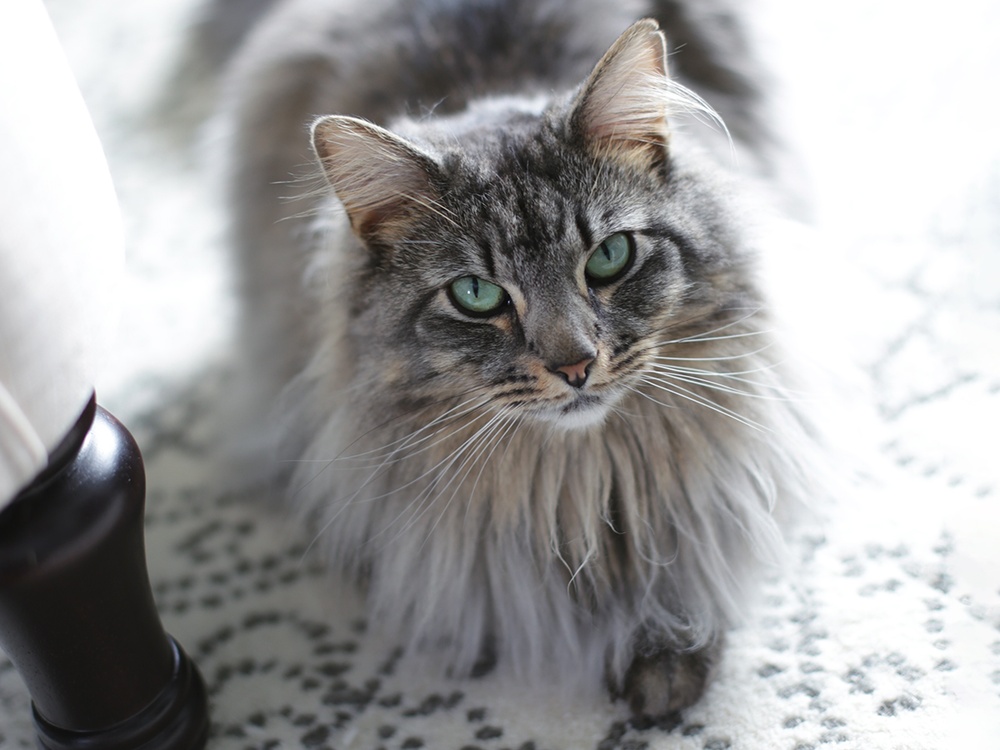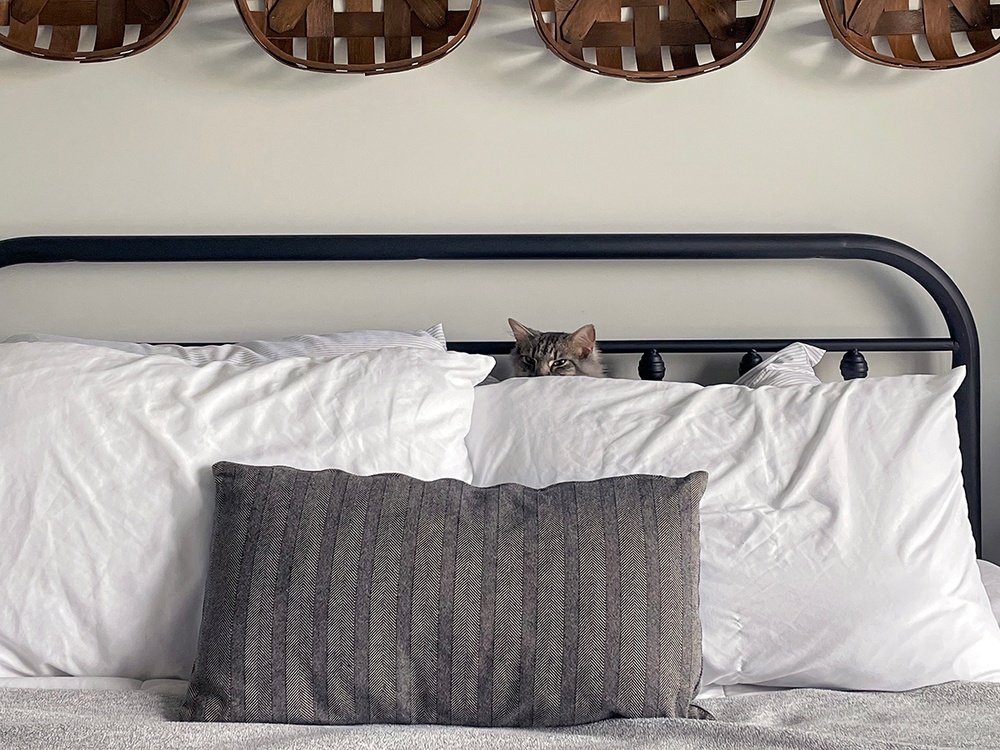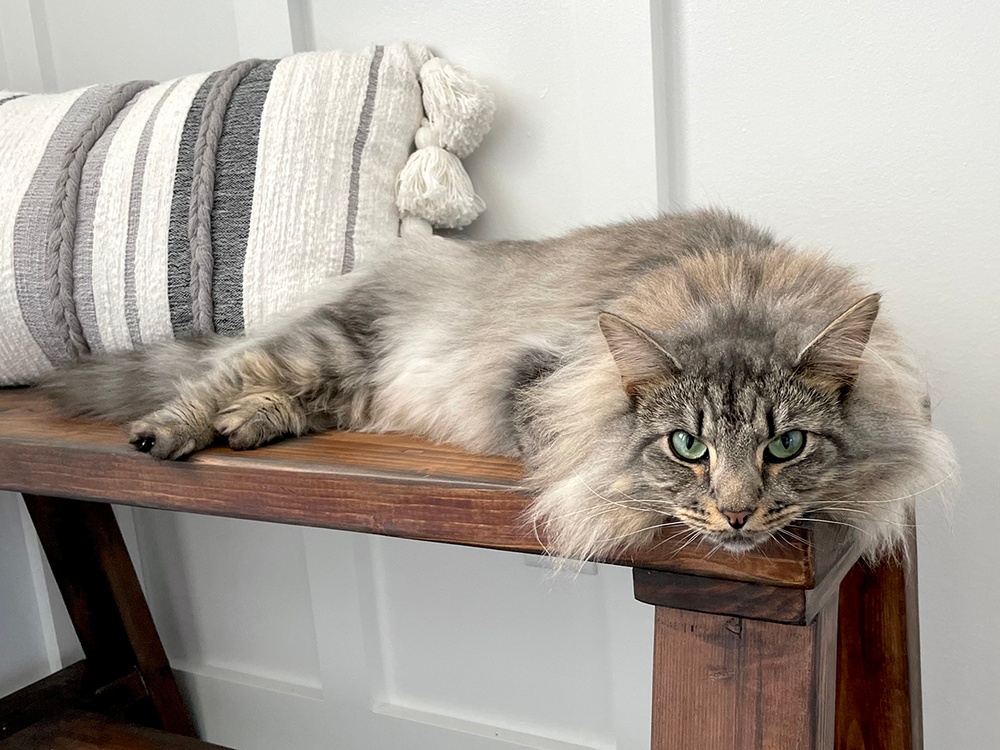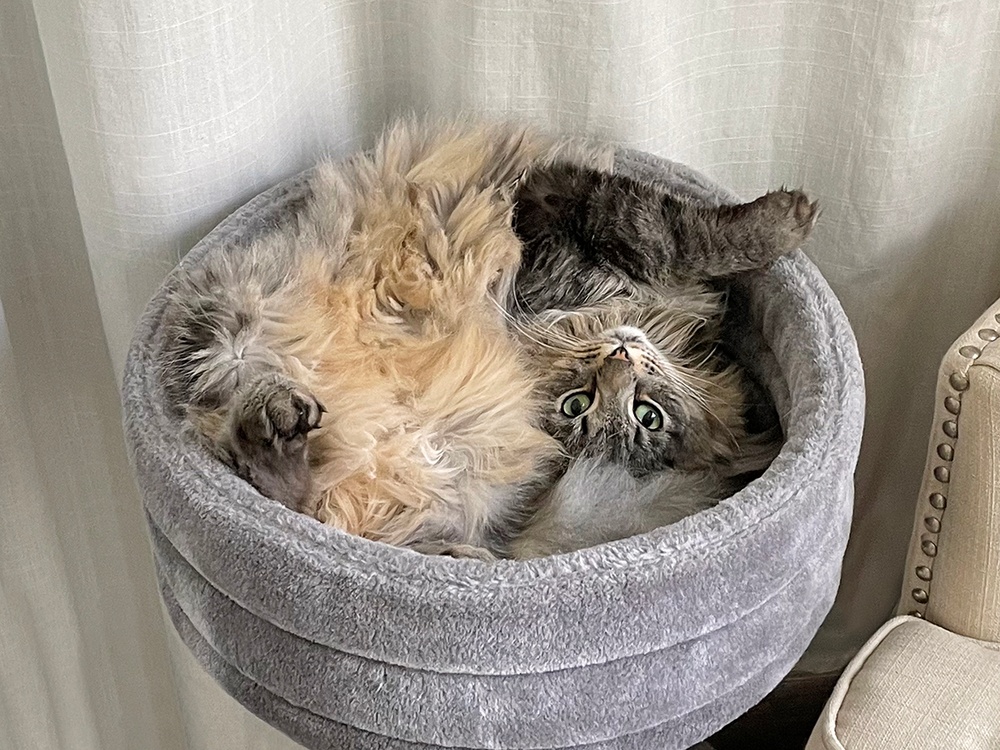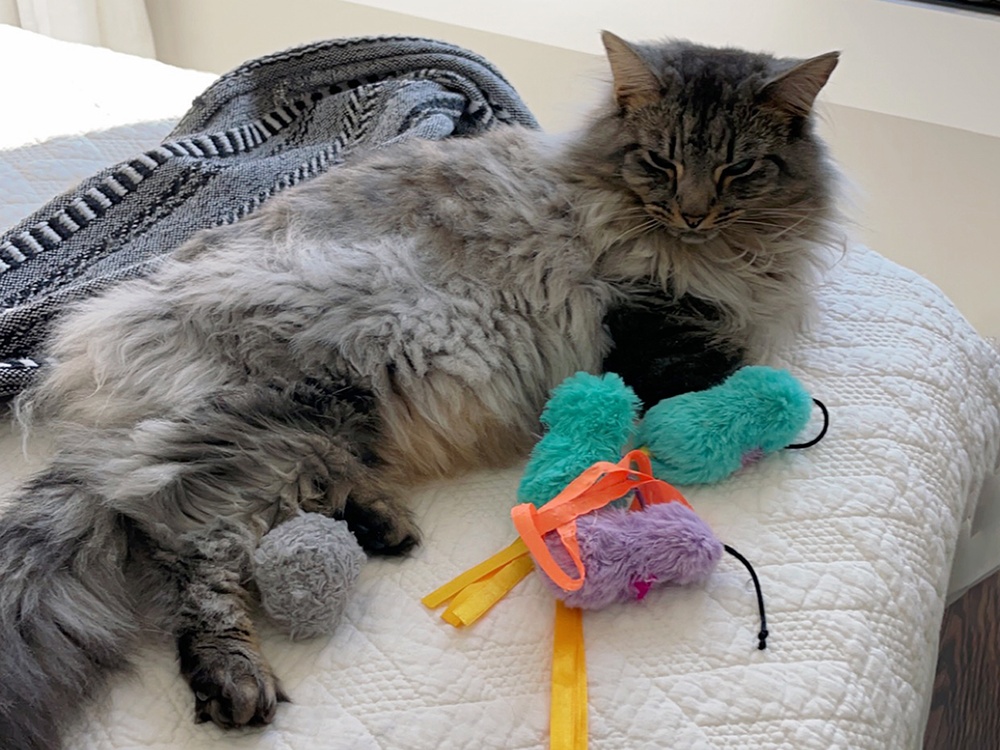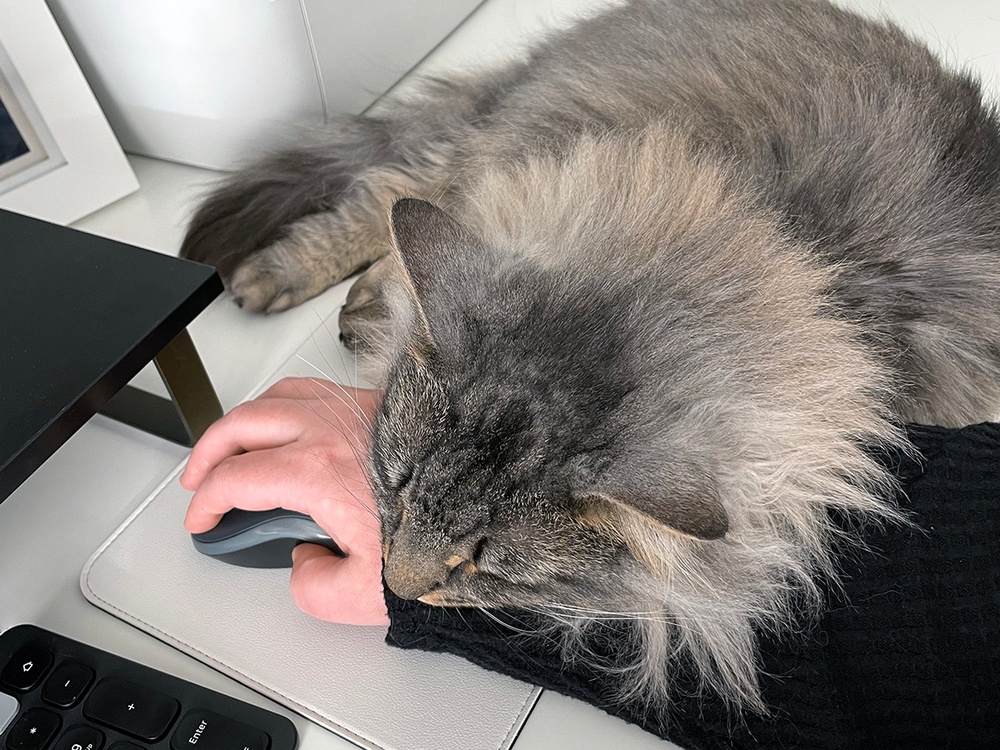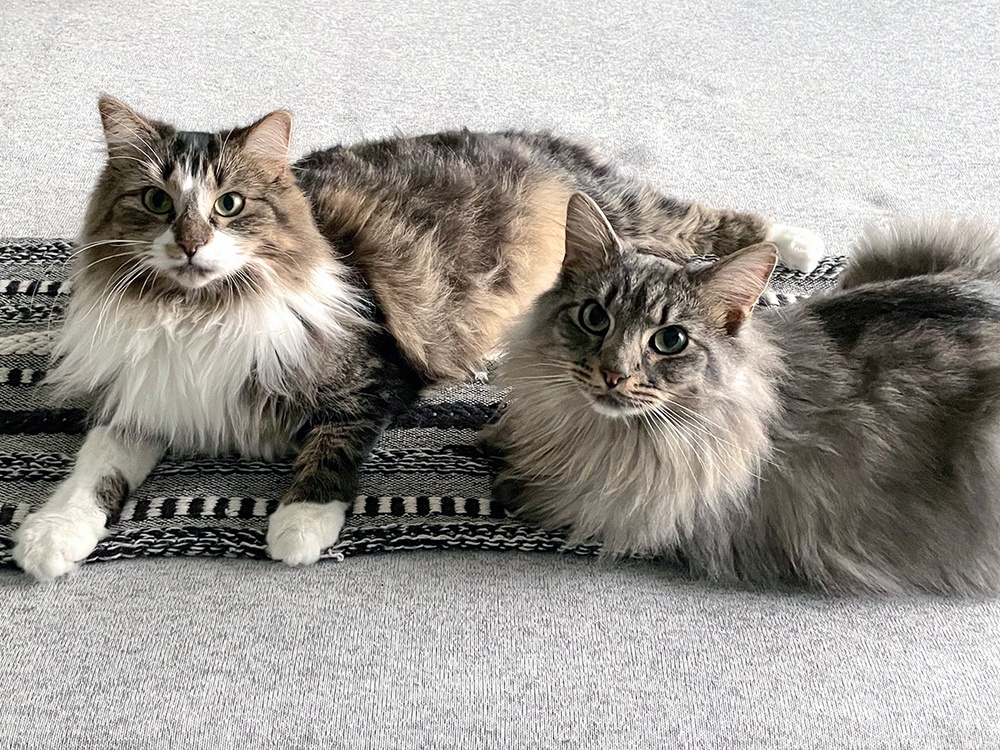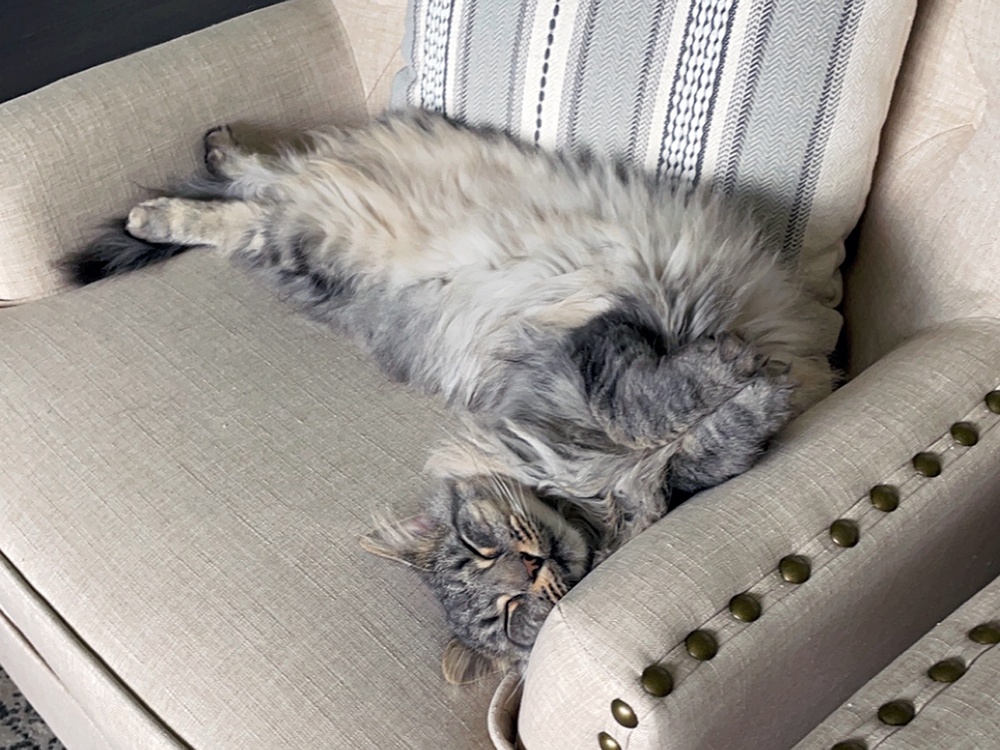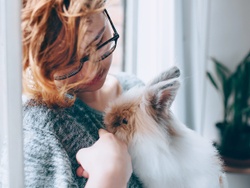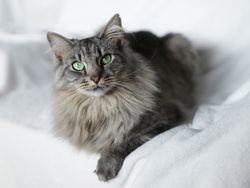How To Help Your Cat With Separation Anxiety
Last summer, I adopted two cats from our local rescue organization. Once they both settled in, I noticed that one of them, Pepper, became upset when left alone for too long. Her cat anxiety symptoms were different from what we experienced with my Pomeranian Sadie, who struggled with dog separation anxiety. I knew I wanted to act fast to learn about how to help Pepper’s separation anxiety.
Can Cats Have Separation Anxiety?
Contrary to popular belief, cats are social creatures, who bond deeply with their human families. A recent study shows that cats living with humans have similar attachment styles as children to their pet parents.
Just like humans, cats with separation anxiety experience anxiety and fear when apart from their caregivers. Cat anxiety is often expressed in ways that range from frustrating (destroying an armchair) to dangerous (like refusing to eat). Luckily, treatment for cat separation anxiety ranges from at-home remedies to prescription medication. You can help your cat with separation anxiety.
Why Do Some Cats Develop Separation Anxiety?
Specific causes of cat separation anxiety are not definitively known yet, but researchers believe it is a combination of environmental and hereditary variables.
Certain factors can make your cat more likely to develop separation anxiety, but the trigger is usually a drastic change in their life such as:
A change in ownership
Moving to a new home
Loss of a family member, including other pets
A drastic change in routine such as a work-from-home pet parent returning to the office
While any cat can develop separation anxiety, some cats are more prone to developing anxiety disorders. Orphaned kittens or those who were bottle-fed/weaned early, female cats, cats who are the only pet in a household, or cats that are unaccustomed to consistent human interaction are most at risk.
How Can You Tell If Your Cat Has Separation Anxiety?
Separation anxiety is more than your cat feeling nervous when separated from you. It is a medical condition that causes significant distress to cats and stress to their pet parents. Every cat has a unique personality and may deal with anxiety differently. Cats with separation anxiety typically show these common signs:
Excessive meowing, crying, or yowling
Elimination outside the litter box
Eating too fast or not at all
Excitement upon returning from home that’s out of the ordinary
Vomiting when alone
Repeated attempts to escape
Excessive self-grooming: more common in female cats
Destructive behavior: more common in male cats
Seeking constant contact with their caregiver
Exuberant greetings when the caregiver returns home
Signs of separation anxiety in cats can escalate quickly if ignored. If your cat’s symptoms are severe or you have concerns for their safety consult your emergency veterinary hospital right away. Cats are notorious for hiding symptoms of illness.
The signs of cat separation anxiety could also be caused by other health issues. If your cat is showing any of these clinical signs, schedule an appointment with your veterinarian. A thorough medical workup is useful to correctly diagnose the medical issues and discuss appropriate cat anxiety treatment options.
How Do You Stop Separation Anxiety In Cats?
In helping your cat overcome their separation anxiety, the most important thing to keep in mind is that they are not choosing to act out. They are struggling with fear that is simply unmanageable. Remain calm and confident in your training as cats pick up on human emotions. If you are calm it will help them to also be more calm.
When working with your cat on their separation anxiety, take small steps so your cat can learn and adapt. Prioritize not making any other major changes while working on your cat’s separation anxiety – this is not the time to try out a new food or litter brand.
If your cat has moderate to severe separation anxiety, consulting your veterinarian or an animal behaviorist is the best first step.
Homeopathic Options To Treat Cat Separation Anxiety
Plenty of home remedies and natural options have shown effectiveness in treating cat anxiety. If your cat has mild symptoms, start small and see what options work best for them.
Meet Your Cat’s Needs
Your cat has species-specific needs. When left unmet your cat’s stress baseline will be elevated making them more prone to developing cat anxiety. A clean and large enough litter box, horizontal and vertical scratchers, enrichment toys, a personal space/bed, fresh water, and high-quality food are the basics to a happy, healthy cat.
Pepper’s Review: I purchased every scratcher type known to mankind to find one that my cats would love more than our sofa. Along with all the necessities they needed – including a cat water fountain just to make their lives a little better.
Create A Safe Zone
Every pet deserves a safe space that they can retreat to when feeling unsure – or even just when they need a break. A cat tree with an enclosure, perch, a calming cat bed, or even a special nook in the home can help a cat to self-soothe.
The key is comfort and camouflage to help your cat feel more secure. Consider offering a few high perching and resting spots (mine love to sleep on top of my bookcases). Cats often feel safer when they are in elevated settings.
Pepper’s Review: Along with the tops of my bookcases, Pepper has a couple beds and also has taken over our guest bedroom. We give her plenty of space when she needs it. I feel that respecting when she does and doesn’t want attention helps us bond faster.
Provide Mental Stimulation
Anxiety is often shown in physical symptoms, but it is also a mentally exhausting condition. One helpful and easy way to stave off separation anxiety is giving your cat plenty of mental stimulation – both when you’re home and especially when you’re away.
At home, dedicate time daily to play with your cat. Their nature as a hunter drives their need to track and chase. Not only is play a great way to meet your cat's needs and even bond with them it is also comforting to cats. When you make a routine of playtime with your cats, it gives them a sense of routine.
When you are away, leave your cat with their favorite (safe) toys. You can try out enrichment toys like treat puzzles and feeder toys which are toys that your cat has to play with to release the food inside, feeding their hunting drive and their belly.
Give your cat access to windows to watch the neighborhood wildlife or leave on a cat-friendly TV channel to keep your cat’s mind busy.
Pepper’s Review: Pepper lives to hunt and chase, scratch, and run. We tried out every type of scratcher and I typically buy a new toy with my monthly Chewy order to keep her mind and muscles busy. We also placed scratchers with beds or perches near several windows in our home so our cats can watch the birds. They quickly became favorite hang-out spots for both of our cats.
Pheromone diffusers
Pheromone treatment has been shown to help calm cats in many stressful situations. They work similarly to wall outlet fragrance diffusers. Instead of emitting fragrance, these diffuse a synthetic version of the pheromones your cat marks their safe areas and territory with. Don’t worry, humans can’t smell natural or synthetic pheromones.
When you see your cat rubbing their face on a chair or wall corner, they are marking it with their pheromones. Diffusing the pheromones that your cat uses to signal safety helps them feel more secure.
Pepper’s Review: When we adopted Pepper, we also adopted Sugar. Because they didn’t know us or each other we utilized pheromone diffusers like Feliway spray to help with the transition. We also worked slowly on introductions and am proud to say there was no aggression and minimal stress while they acclimated to their new home and family.
Address Anxiety Triggers
Your cat will pick up on the little clues that you are leaving very quickly. Picking up your keys or opening the coat closet can send them into an anxiety spiral. By addressing and minimizing these triggers, your cat won’t feel on high alert every time you reach for your bag.
Space out your steps when leaving like grabbing your keys, coats, shoes, etc. You can even desensitize your cat to these triggers by picking up your keys and carrying them around for 10 minutes then putting them down when you have no intention of leaving.
You can also help your cat understand that it’s normal and boring for you to come and go. Practice leaving for short bursts, start with less than a minute, and come right back in. Then slowly extend the time away. This can help your cat understand that you will always come back and that they haven’t been abandoned.
Pepper’s Review: Pepper would become nervous when we opened our coat closet so we started opening it randomly throughout the day for periods of time. Then we started closing the door to the garage behind us when accessing our deep freeze or doing something quickly outside. By not making a big deal out of leaving, we modeled that it was a normal part of daily life, which made it less scary for Pepper.
Maintain a Routine
Consistent routines are great for all pets, as both cats and dogs pick up on and thrive on household routines. But these are especially beneficial for pets with anxiety disorders. Keeping your daily activities as close to the ‘normal routine’ as possible will help them to feel more secure.
Pepper’s Review: I believe this cat can somehow tell time. From our evening play time to the special wet food dinner, she is always punctual. I believe that keeping a normal routine helps Pepper know what to expect and gives her a sense of general safety.
Cat Sitter Check-Ins
If your cat can handle shorter times apart but can't tolerate longer separation, having a pet sitter check in on them is a great option. When you know your cat is dealing with separation anxiety, a pet sitter can help smooth some of your anxiety about your cat’s anxiety by sharing updates.
Pepper’s Review: When we go away on a long weekend or on a vacation, our pet sitter checks in on our cats regularly. We are lucky to work with an individual pet sitter so our pets are comfortable with her. Seeing quick photos of my cats doing well gives me peace of mind.
How To Help A Cat With Separation Anxiety: Supplements and Medications
Talk with your veterinarian about the severity of your cat's symptoms and if supplements like cat calming treats or prescription medication would be the best option. Supplements and medication can be used temporarily, as needed, or as a long-term solution.
If you’re interested in essential oils for cat anxiety, talk with your veterinarian as many essential oils are toxic to cats.
Common medications including Gabapentin and Catapres for cat anxiety are given in a daily dose by mouth. Your vet can offer tips on medicating your cat as some are less than agreeable to taking medications.
What Won't Help A Cat With Separation Anxiety
The internet is full of ways to ‘fix your cat’s separation anxiety' but some advice can be ineffective and even make things worse:
Getting an Additional Pet: Unless you adopt two cats together, adding another pet to the mix could very likely lead to higher stress and even aggression.
Punishment: Your cat is not acting out or with malicious intentions. They are suffering from an illness they can’t manage. Punishment will make the behavior worse.
Confinement: Cats with separation anxiety often panic when left alone or if they are caged.
Your Cat Can Overcome Separation Anxiety
Cat separation anxiety can feel overwhelming for pet parents but the good news is that most cats can be helped. It may take time, effort, or medications, but your cat can feel calm and secure when alone, and overcoming their anxiety together will strengthen your bond.
Does My Cat Have Separation Anxiety Quiz
The more symptoms or more often your cat experiences signs of separation anxiety directly equates with how likely they are to be diagnosed with separation anxiety. Talk with your veterinarian about options to help your cat to live their best life.
Expert Answers from a Veterinarian on Helping Your Cat With Separation Anxiety
Q: What first steps should I take if I think my cat has separation anxiety?
A: If you believe your cat has separation anxiety, try to identify the cause. Keep a diary of the behaviors and try to identify and modify a trigger if possible. Contact your veterinarian to schedule an appointment once the behaviors are noted. Try at-home remedies in the meantime to see if they can provide your cat with relief.
Q: When should I talk to my veterinarian about my cat’s separation anxiety?
A: At the first sign of a problem, pet owners should reach out to their veterinarians. Early intervention can prevent the condition from worsening or spiraling out of control. Your veterinarian can rule out underlying health concerns, refer you to a behaviorist or trainer, or even discuss medication options.
Q: When is medication the right answer for my cat with separation anxiety?
A: Medication is never a wrong answer to address separation anxiety. Despite a negative stigma, anti-anxiety medication helps pets sooner and can make the training experience more positive. Animals treated with anti-anxiety medication may improve faster than others without.
Fact checked by Veterinarian

Dr. Paula Simons is an Emergency and Critical Care veterinary resident on her way to becoming a veterinary criticalist. She is originally from Philadelphia, Pennsylvania, and completed her veterinary training in Ontario, Canada, at Ontario Veterinary College. Dr. Paula Simons has a particular interest in critical care nutrition, trauma, and pain management. She enjoys the management of surgical patients and troubleshooting complex cases. Additionally, she is a huge advocate for her patients and ensuring their comfort. She has two cats named Moo and Kal, whom she loves dearly. More About Us
